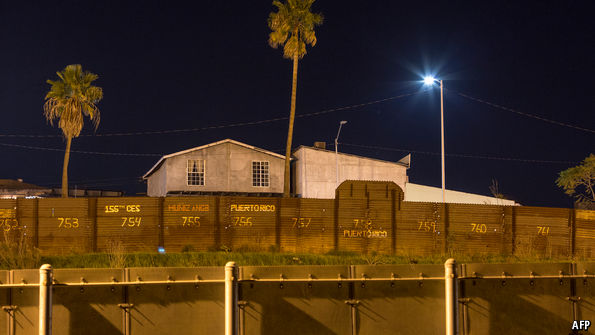But the conflict that Donald Trump has provoked with Mexico is causing unease, even dread in Tijuana, a city of 1.7m people. “We’re heading for confrontation,” says David Mayagoitia of the Tijuana economic development corporation. “It’s just the details that are still to be discovered.” José Luis, a driver, fears that “Trump will declare war,” an actual shooting war, “if we don’t pay for the wall.” This is far-fetched, but one can see why Mexicans are worried.
Mr Trump’s executive order to start building his long-threatened border wall was among the 14 he signed during his extraordinary first week in office. It also calls for an increase in the number of border-patrol agents and customs officers. Another order partly aimed at Mexico threatens to cut off federal money to “sanctuary cities” (those that make no effort to catch or help deport illegal immigrants). Mr Trump vowed again to make Mexico pay for the wall. Perhaps, his underlings mused, the way to do this would be to impose a 20% tax on Mexican exports to the United States.
Mexico’s president, Enrique Peña Nieto, tried to keep his cool. He condemned the wall directive (signed, insultingly, the day Mexico’s foreign minister arrived in Washington for informal talks). But he did not at first cancel his plan to visit Washington on January 31st. On January 26th Mr Trump fired off an intemperate tweet: “If Mexico is unwilling to pay for the badly needed wall, then it would be better to cancel the upcoming meeting.” That left Mr Peña with no choice but to call it off.
The two presidents later spoke for an hour by telephone. During the call they “acknowledged their clear and very public differences” on how to pay for the wall, according to the Mexican statement. But this leaves Mexicans none the wiser about what Mr Trump’s new “fair relationship” with Mexico will look like.
For Tijuana, any arrangement that disrupts the 23-year-old North American Free-Trade Agreement (NAFTA), which includes Canada, would be a disaster. More than 200,000 jobs are in maquiladora factories, in which workers assemble parts for export, mainly to the United States. Of the $530bn in bilateral trade between the United States and Mexico in 2015, $43bn passed through Tijuana. Gilberto Leyva, who runs the city’s branch of the national chamber of commerce, fears that many maquiladoras will close. If Mr Trump imposes a 20% border tax, 30,000-40,000 jobs could be lost, reckons Mr Mayagoitia.
Tijuanenses have worries beyond trade. Many Mexicans fear that Mr Trump’s order could raise sharply the number of deportations. Under Barack Obama these were already very high: 360,000 a year on average from 2009 to 2015. Many deportees might stay in Tijuana to remain near friends and relatives in the United States or to wait for a chance to return. That could cause problems. “Tijuana is already over-populated,” says Mr Leyva. Ignacio Castillo, who sells books from a stand in a park, worries that Mr Trump will deport mainly people with criminal records. “Good people are fine, they’ll work,” he says. “But bad people….” He leaves the thought unfinished.
The escalation of the conflict has caused some Mexicans to rally round their unpopular president. Mr Peña’s approval ratings had fallen to an abysmal 12% after the government sharply raised petrol prices on January 1st, provoking demonstrations and looting. But his cancellation of the trip to Washington has given Mexicans a patriotic lift. While hoping for peace, Mexican officials are steeling themselves for a diplomatic and commercial war. Ildefonso Guajardo, the economy minister, has said that Mexico would prefer to walk away from NAFTA than to accept a renegotiated deal on terms that are worse than the current ones. Mexicans are more used to suffering, says an official in Tijuana; it is Mr Trump, he suggests, who has more to fear from a trade war that would raise prices and destroy jobs in the United States.
That fighting spirit is tempering Tijuana’s anxiety. The city will “adapt and diversify”, says David Moreno of the mayor’s office. He thinks the situation was worse during the recession caused by the global financial crisis in 2008. No tariff that Mr Trump imposes is likely to wipe out Mexico’s cost advantage, some businessmen believe. The manager of a car-parts factory points out that his (non-unionised) workers earn $2 an hour, while Americans doing the same job are paid $11. “Even with a 20% tax, I will still be able to sell to the Americans,” he says.
Maquiladoras are used to cutting costs and can do so again, by automating, generating their own electricity and using local suppliers, the factory manager says. The mayor’s office is working on packages of incentives for investors, including reductions in property taxes and fees for permits. It is stepping up promotion of Tijuana in Asia and Europe as a destination for investment. Even if NAFTA collapses, Californians will still come for cheap dentistry and a legal drinking age of 18 (three years younger than that across the border).
Nor does the wall hold terrors for feisty Tijuanenses. The border in this area is already protected by a 74km-long fence. Locals find ways around it. One boasts that he got into the United States by paying to borrow the papers of a man who looked like him. “There are many ways to cross to the US,” says another man. “And we’re experts.”





